The Twitter account undermines other vaccines and promotes Sputnik V, benefiting from a deceptively inflated follower count
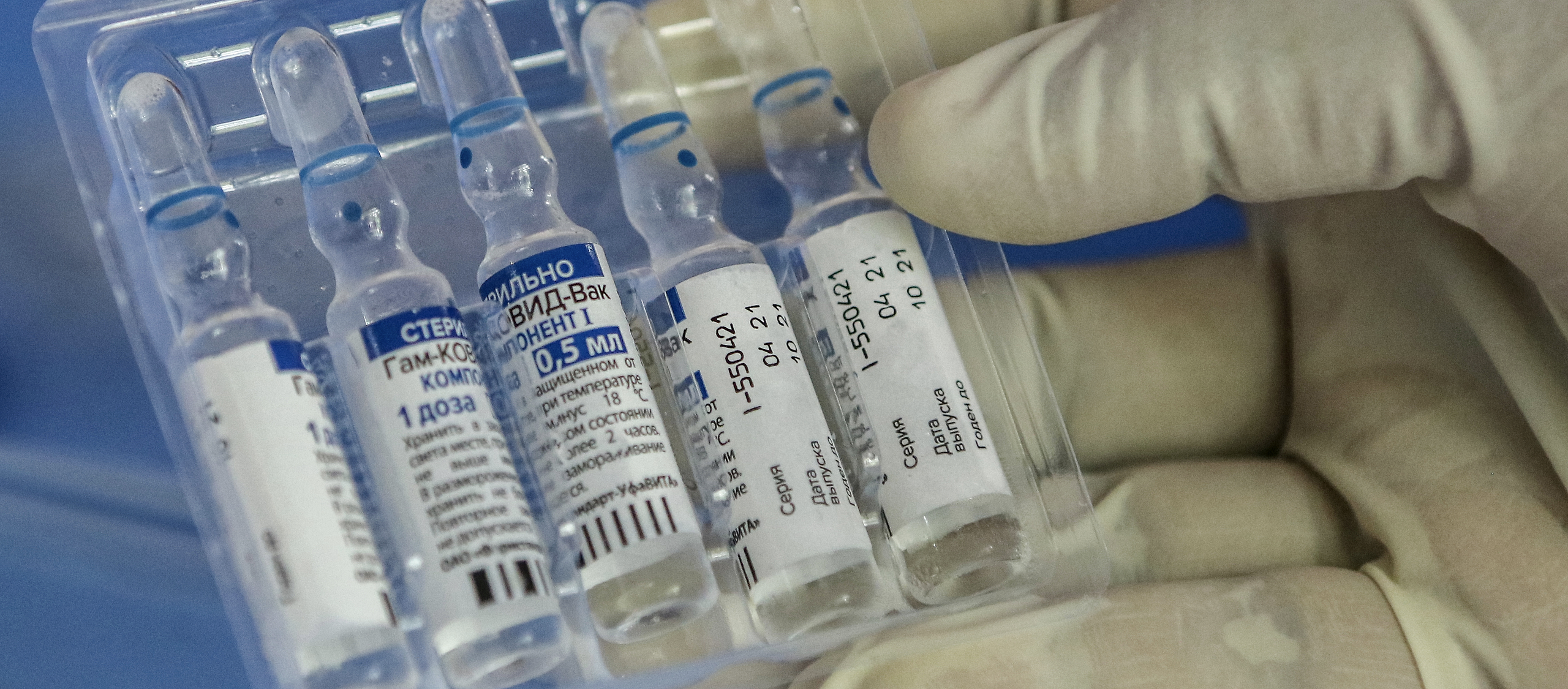
By Eto Buziashvili and Jean Le Roux
Western governments and experts have accused Russia of attempting to discredit Western-developed COVID-19 vaccines in favor of the Russian alternative, Sputnik V. To this end, the verified Sputnik V Twitter account (@SputnikVaccine) has engaged in information manipulation and the spread of propaganda to its roughly 455,000 followers on the platform. The account targets Western leaders and critics, as well as amplifies negative criticism of Western vaccines, while promoting Sputnik V’s efficacy.
The U.S. government has accused Russian intelligence services of carrying out a disinformation campaign aimed at undermining confidence in Western-produced COVID-19 vaccines, saying Moscow was putting lives at risk. The U.S. Department of State’s Global Engagement Center (GEC) stated that Russian intelligence was behind multiple online platforms spreading anti-vaccine messaging. According to the GEC, the websites played up the Western vaccines’ risks of side effects, questioned their efficacy, and reported the United States had rushed the Pfizer vaccine through the approval process, among other false or misleading claims.
Additionally, the Alliance for Security Democracy recently published a report indicating Pfizer’s vaccine has been the prime target of Russian disinformation. According to the report, Russian state media outlets misleadingly suggested links between the Pfizer vaccine and subsequent deaths of vaccine recipients, despite no evidence of a causal connection.
Amid Russia’s efforts to expand Sputnik V distribution to European countries, Ursula von der Leyen, the head of the European Commission, questioned Moscow’s reasons for exporting millions of doses of Sputnik V despite a slow rollout at home. According to Bloomberg, as of April 3, 2021, only 4.3 percent of the Russian population, or 6.3 million people, had received at least one dose of the vaccine, despite Russian officials’ plans to vaccinate 20 million people by the end of March.
While Hungary has begun mass vaccinations with Sputnik V, the European Union overall has been divided over it. Lithuania’s prime minister labeled the vaccine “another hybrid weapon [of the Kremlin] to divide and rule” Europe. France’s foreign minister called Sputnik V a “propaganda tool,” accusing Russia of using its COVID-19 vaccine as a means to spread Moscow’s influence. Slovakia’s prime minister, meanwhile, resigned amid a political scandal triggered by a secret deal to buy Sputnik V vaccine. And Austrian chancellor Sebastian Kurz has accused the European Medicines Agency (EMA) of being too slow in approving the vaccine. Kurz also clashed with German Chancellor Angela Merkel, complaining about the bloc’s vaccine distribution process, which according to Kurz, favors larger Western states over smaller ones.
While the possible side effects of the Western-developed vaccines have been widely reported, Russia has repeatedly failed to follow procedures and ensure transparency for its own vaccine by providing the data needed by foreign regulators to assess the vaccine’s safety.
Negative space
Sputnik V is named after the world’s first satellite, launched by the Soviet Union during the Cold War. Sputnik V has a Twitter account, @SputnikVaccine, which was created on August 11, 2020, and which was verified on Twitter at the beginning of March 2021. At the time of writing, no other vaccine has an official Twitter account.
@SputnikVaccine tweets in multiple languages. In addition to promoting the vaccine itself, the official account attacks its Western competitors by casting doubt on their safety and efficacy.

While it is unique for a COVID vaccine producer to sow confusion publicly and doubt toward its competitors via a verified account, these same tactics have been employed by Russia’s official government accounts on Twitter in recent years. The DFRLab previously covered how the Kremlin’s diplomatic Twitter accounts attempted to rewrite the history of World War II by spreading manipulated narratives, and how various Russian embassy accounts mocked the United Kingdom’s response to the Skripal poisoning via “troll diplomacy.”
@SputnikVaccine, however, frequently denies that it is politicizing the topic of vaccines, accusing the Western vaccine makers of doing so instead.
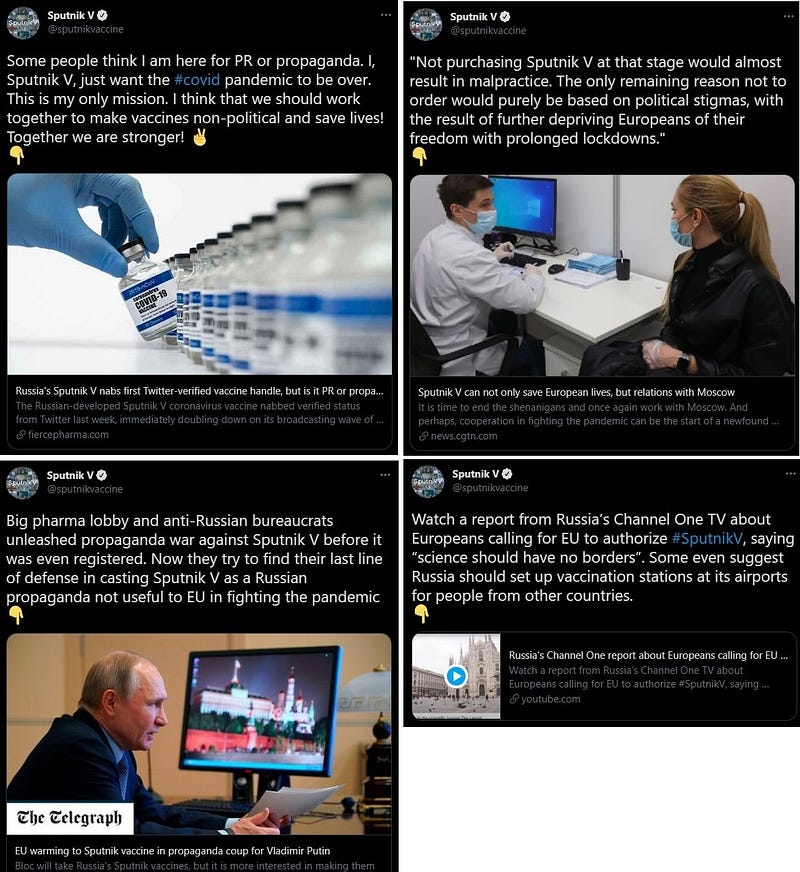
The Sputnik V account has also selectively shared articles playing up the risk of blood clots from the Pfizer, Moderna, and AstraZeneca vaccines. In multiple instances, the account also struck a sarcastic tone, such as when it wrote that Western vaccine recipients were having “dreams of space and Sputnik.” In another instance, the account promoted the idea of a Sputnik V booster shot while referencing the Snow Patrol song “Open Your Eyes.”
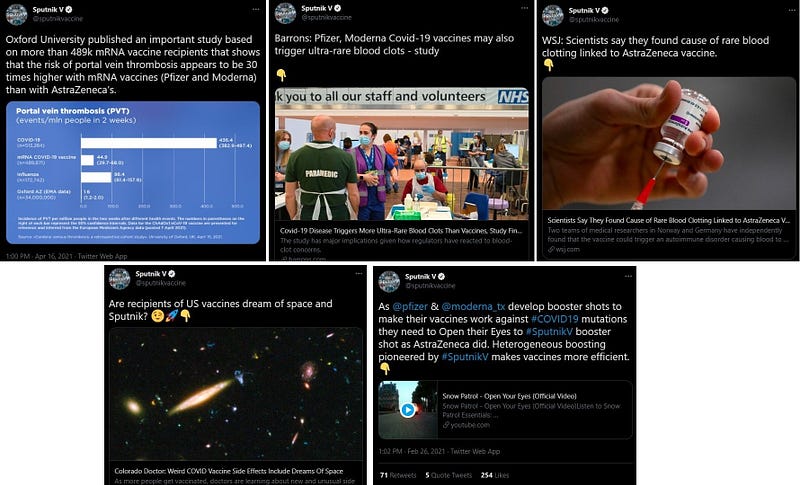
In addition to marketing its own safety record and global rollout, the account has been used to antagonize critics. After Reuters quoted EU Commissioner Thierry Breton as saying Sputnik V is “probably a good vaccine” but that the EU should “probably help Russia” with manufacturing it, @SputnikVaccine tagged Breton in several retorts. These included threatening to suspend its European Medicines Agency (EMA) approval application, labeling Breton as hubristic and biased, and employing sarcasm in reference to Breton’s role as EU internal market commissioner. Similarly, attacks claiming Brazilian regulator Anvisa was politically compromised followed Brazil’s rejection of Sputnik’s authorization for emergency use.
Math, science, and history
In addition to mockery and biased news sharing,in an effort to question the safety record of its competitors, @SputnikVaccine has spread antivax narratives claiming higher death rates had been observed among Pfizer recipients. To back this claim, the account presented invalid and manipulated statistics.
In a Twitter thread responding to these tweets, University of Washington Professor of Biology Carl T. Bergstrom debunked Sputnik V’s claims. “Today’s antivax propaganda comes from a….vaccine manufacturer?” he asked rhetorically. “Unfortunately, yes. The manufacturer of the Sputnik V vaccine is tweeting absolutely nonsense statistics in an effort to question the safety record of its competitors.”
https://twitter.com/CT_Bergstrom/status/1387152608318480385/photo/1
According to Bergstrom, the numbers in the left column of an infographic amplified by @SputnikVaccine show country-level averages, unweighted by number of recipients. In the right column, it shows weighted averages, presenting total deaths, not vaccine associated deaths. Bergstrom stated that the Sputnik V account is spreading “a message promoting fear around the leading vaccine candidates while making the manufacturer’s own vaccine look good.”
Meanwhile, @SputnikVaccine promoted a report by Russia’s Ministry of Health suggesting that the Russian vaccine’s efficacy is 97.6 percent, and that it is 100 percent effective in preventing severe cases of COVID-19. These claims, however, have not been verified by an independent party or regulator, and Moscow has largely not been transparent in providing the data to foreign regulators to assess the vaccine’s safety.
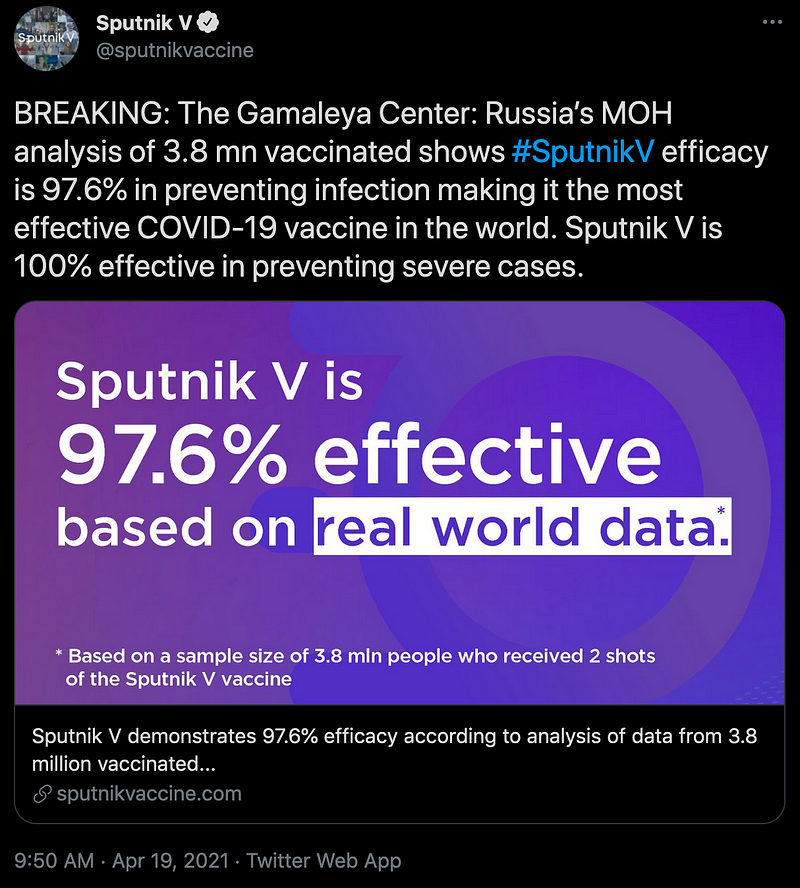
@SputnikVaccine also invoked Russia’s long history of vaccine development in an attempt to increase the level of trust in Sputnik V, citing efforts by the USSR in one tweet. Elsewhere, they wrong, “History of vaccine development in Russia goes back 250 years to the first vaccine received by Katherine the Great.”
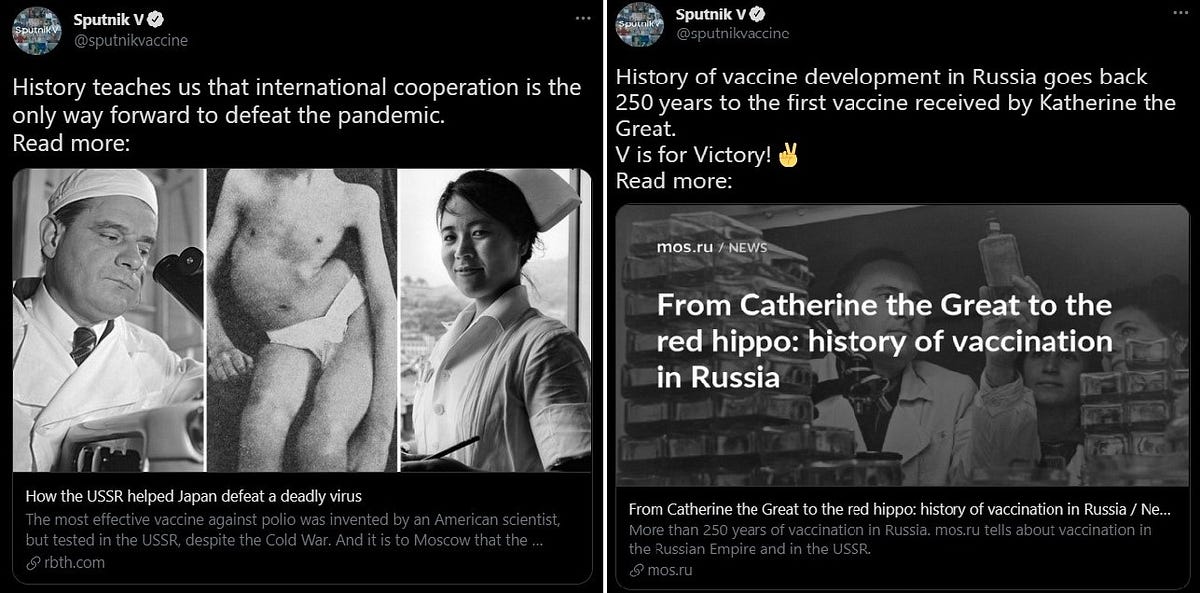
Unraveling the mystery
The @SputnikVaccine Twitter account was created on August 11, 2020, but only started tweeting in early November 2020. Until its first tweet, @SpunikVaccine was only mainly mentioned by @RDIF_press, the Twitter account of the Russian Foreign Direct Investment Agency (RFDI), which funds Sputnik vaccine development in countries like Argentina and India.
Once it started tweeting, @SputnikVaccine was propped up by likes and retweets from Russian embassies and diplomats, ensuring respectable engagement on Twitter despite relatively low follower numbers at the time.
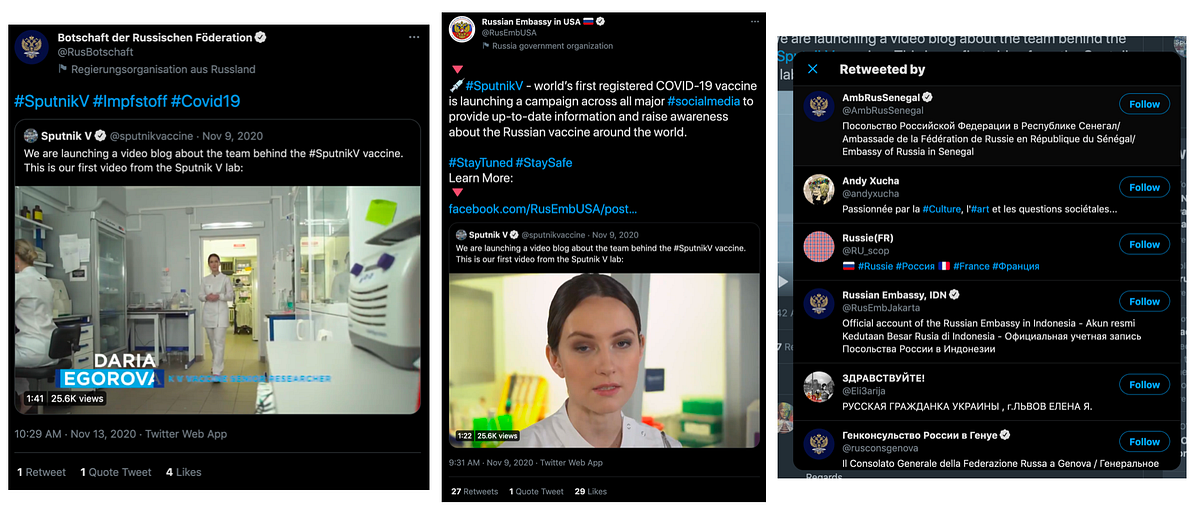
The orchestrated amplification of the account by Kremlin-linked media was especially apparent. According to social media monitoring tool Meltwater Explore, Russian state-affiliated media Sputnik was one of the highest referrers to the account, mentioning it more than 500 times between August 11, 2020, and April 29, 2021.
Since then, @SputnikVaccine has shown a distinct appreciation for its follower numbers as a metric for success, as well as the impact disinformation has on vaccine hesitancy.
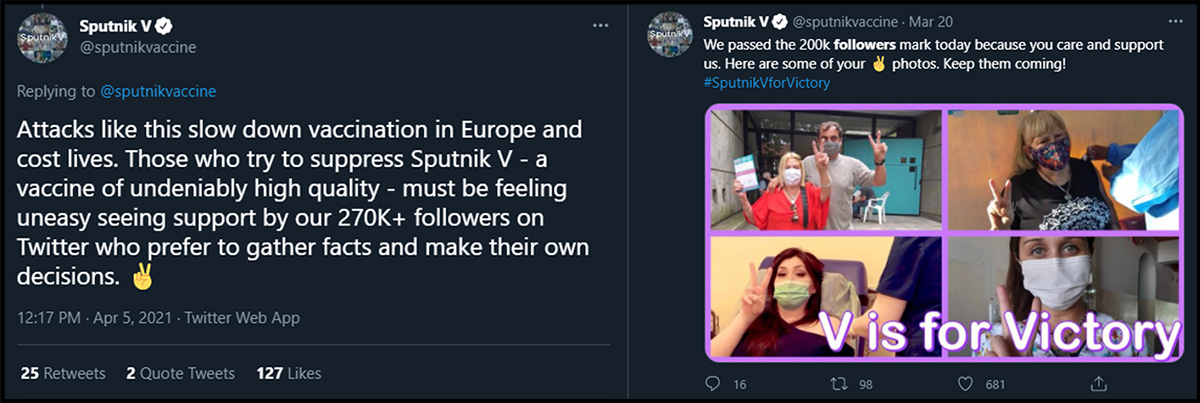
An analysis of the followers of the account presented with a puzzling anomaly: a surprisingly large proportion of the accounts following @SputnikVaccine were created before November 2018. Since Twitter tracks the followers of an account sequentially (i.e., the latest followers would appear on the top of the followers-list, and vice versa) it is possible to visualize the account creation dates of all of @SputnikVaccine’s 430,000 followers using the Twitter API and an R script.
This revealed a marked shift in the profile of the account’s followers around the 38,000-follower mark, represented by a hard “break” in the visualization of the account creation dates of the account’s followers around November 2018.
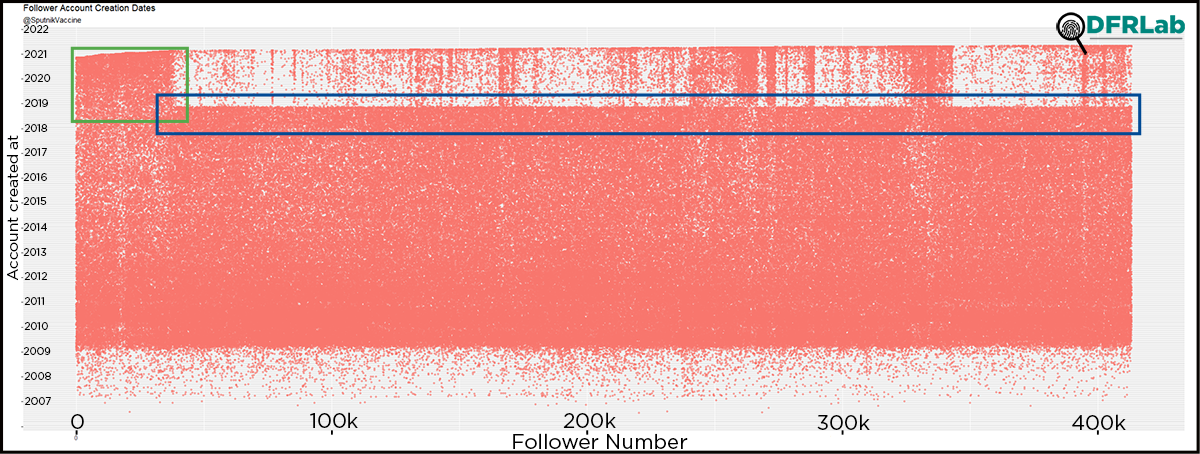
On Twitter, @Conspirator0 first identified this pattern on March 11, 2021. At the time of their analysis, the @SputnikVaccine account had slightly more than 160,000 followers, but nearly 250,000 followers later, this same pattern persists.
This anomaly is even more stark when compared to the follower account creation dates of Moderna and Pfizer vaccines. For example, both @moderna_tx and @pfizer had a significant proportion of newer accounts among their following, as opposed to @SputnikVaccine, which has markedly fewer followers created in 2019 and later.

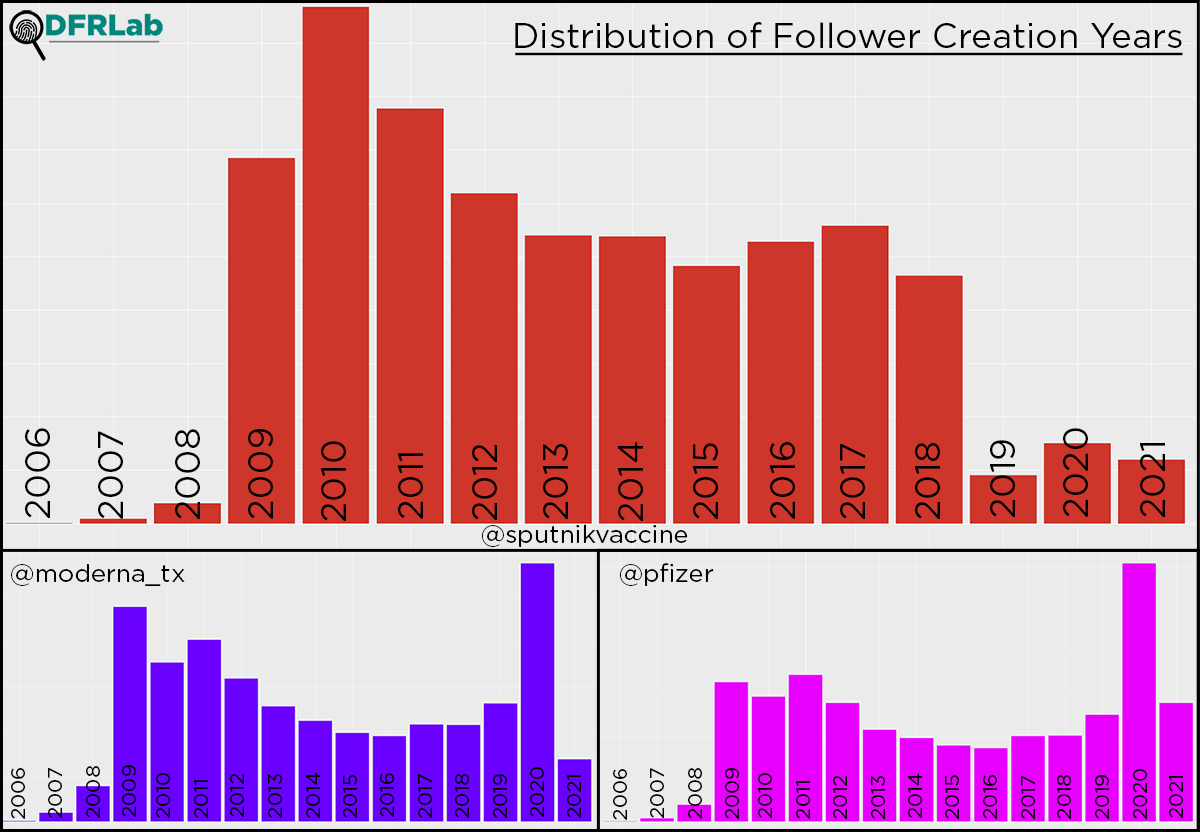
It is not entirely clear what prompts this pattern; as @Conspirator0 recently pointed out, the same pattern can be observed on some accounts that are listed in Twitter’s “who to follow” section, but it remains inconclusive.
Sockpuppets
Investigating deeper into individual accounts amplifying @SputnikVaccine, there is evidence of sockpuppet accounts being used to amplify its tweets. For example, 11 accounts only followed two accounts: @sputnikvaccine and @rdif_press. A total of 455 accounts followed both.
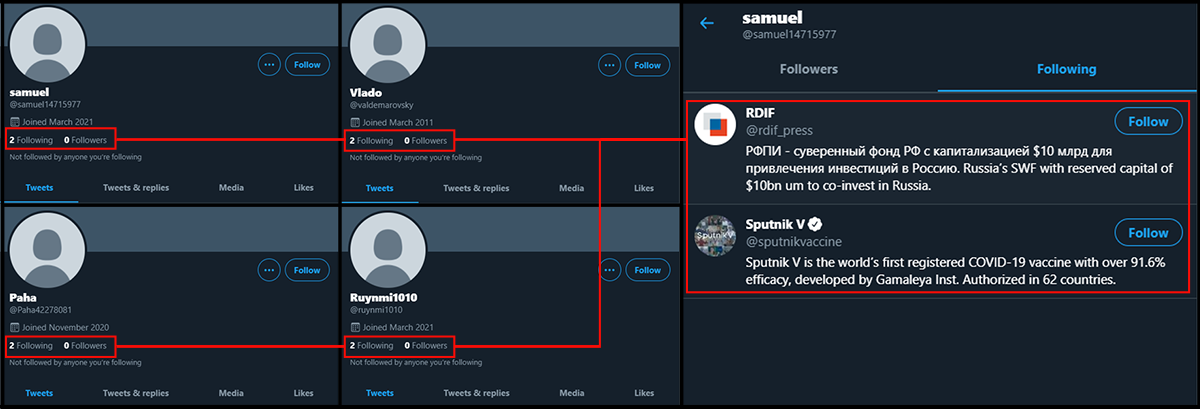
In addition, several seemingly legitimate accounts appear to have been repurposed into liking tweets published by @SputnikVaccine and Kremlin-linked media. Subsets of these accounts initially exhibited normal behavior but appear to have been compromised at some point.

A separate subset of accounts presented themselves as Korean: these accounts were created much more recently but, despite featuring Korean display names, have exclusively engaged with tweets by @SputnikVaccine.
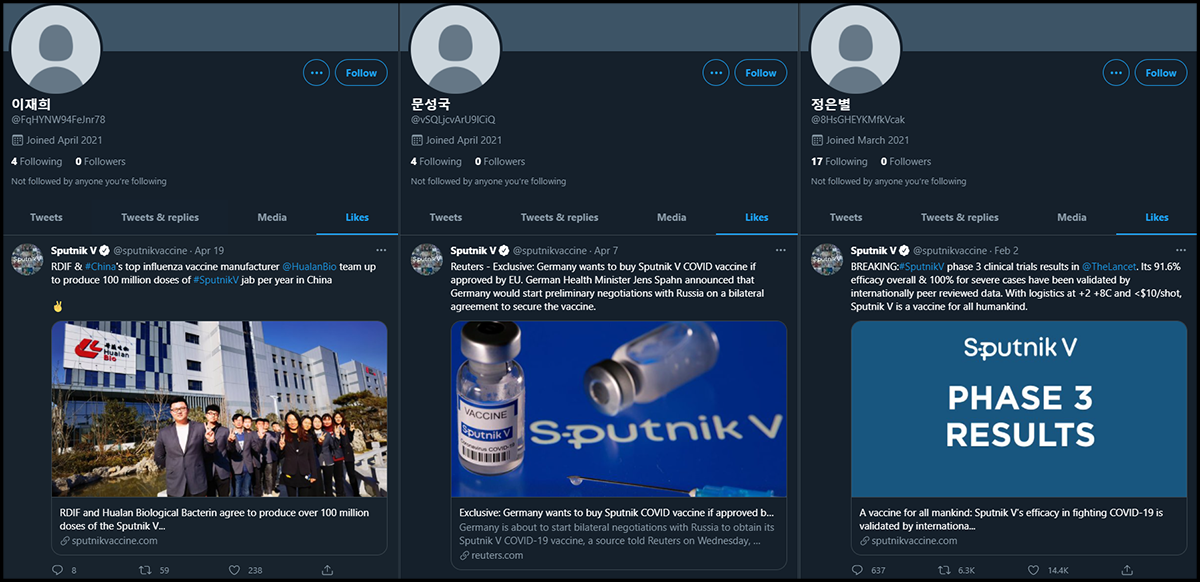
The Sputnik V Twitter account, legitimized through deceptively inflated social media engagements and follower numbers, presents a new, if familiar, vector for the projection of Russian influence globally. It has used this to antagonize Western vaccine manufacturers and critics of Sputnik V.
With the global gaze shifting from merely containing COVID-19 to vaccinating the populace against it, the deployment of @Sputnikvaccine as an influence tool is a timely and strategic play by the Kremlin.
Eto Buziashvili is a Research Associate, Caucasus, with the Digital Forensic Research Lab.
Jean Le Roux is a Research Associate, Southern Africa, with the Digital Forensic Research Lab.
Cite this case study:
Eto Buziashvili and Jean Le Roux, “How the Sputnik V Twitter account manipulates information to target Western COVID vaccines,” Digital Forensic Research Lab (DFRLab), May 11, 2021, https://medium.com/dfrlab/how-the-sputnik-v-twitter-account-manipulates-information-to-target-western-covid-vaccines-c1a13dac580d.
Follow along for more in-depth analysis from our #DigitalSherlocks.

